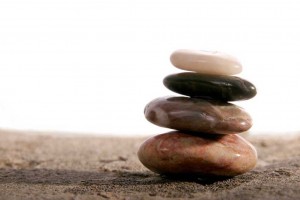‘Twas the week before Christmas and in my own house I was frantic and hurrying, and felt like a louse. That was five years ago. That day I vowed I would never again get sucked into the hyped up of “Christmas Spirit.” Instead of running around, fighting traffic, and losing my temper with store clerks, I decided I would do whatever it takes to really enjoy the holidays. After all, it’s supposed to be a time of celebration and spiritual renewal. Why not make it into one? Of course, if you’re at all like I was, you’re going to have to change how you “do Christmas” if you ever hope to truly enjoy yourself. I’ve found that four simple keys can help people turn their hurried Holidays into heavenly Holy days.
 First, try to remember the original purpose of the Holiday Season. Whether you celebrate Christmas or Hanukah, they both represent a time to appreciate the blessings of life, God’s grace, and the end of darkness and the beginning of new light and hope. Can you remember a Christmas memory from your childhood that was filled with joy, comfort, and love? That’s really what we all want to experience during the Holidays. Yet, sometimes it seems we’re being led down a fast flowing river that only leads to stress, insecurity, and even sadness. By having a clear picture of what a truly happy Holiday Season would be like, you have a fighting chance to create what you want. Without your own unique Christmas “fantasy” to hold onto, you’re likely to be swept into the currents of what everybody around you is doing.
First, try to remember the original purpose of the Holiday Season. Whether you celebrate Christmas or Hanukah, they both represent a time to appreciate the blessings of life, God’s grace, and the end of darkness and the beginning of new light and hope. Can you remember a Christmas memory from your childhood that was filled with joy, comfort, and love? That’s really what we all want to experience during the Holidays. Yet, sometimes it seems we’re being led down a fast flowing river that only leads to stress, insecurity, and even sadness. By having a clear picture of what a truly happy Holiday Season would be like, you have a fighting chance to create what you want. Without your own unique Christmas “fantasy” to hold onto, you’re likely to be swept into the currents of what everybody around you is doing.
Once you have an idea of what you’d like to experience during the Holidays, your next step is to figure out creative ways to avoid what you don’t like about Christmas. For example, if you don’t enjoy running around buying a lot of presents, then don’t. Most people ask themselves the wrong question when it comes to planning their Christmas. Subconsciously, they think, “What should I do now that it’s the Holiday Season?” If you “should” all ask yourself, “What would I love to do to spread joy and good cheer this time of year?” Listen for your own unique answer to that question. By following your heart, you’ll feel the joy of Christmas, and enliven the Spirits of those you love.
 A third way to keep the Spirit of the Holiday’s alive is to give a present to your self. I don’t mean another sweater or necktie. I mean something that will help you to experience the joy, peace, and sacredness of life. Last year, my wife and I spent three days in Yosemite in the middle of December. Leaving the craziness of city life for the grandeur of nature was the best present possible for both of us. This year we plan to go to a desert resort. As we sink into a jacuzzi bath while listening to Mozart, we’ll be sure to reminisce about the madness we left behind back home. What would be some treat you could give to your self that would add meaning, joy, and relaxation to your winter season? Schedule it in now, before you get too swept up in the Christmas rush.
A third way to keep the Spirit of the Holiday’s alive is to give a present to your self. I don’t mean another sweater or necktie. I mean something that will help you to experience the joy, peace, and sacredness of life. Last year, my wife and I spent three days in Yosemite in the middle of December. Leaving the craziness of city life for the grandeur of nature was the best present possible for both of us. This year we plan to go to a desert resort. As we sink into a jacuzzi bath while listening to Mozart, we’ll be sure to reminisce about the madness we left behind back home. What would be some treat you could give to your self that would add meaning, joy, and relaxation to your winter season? Schedule it in now, before you get too swept up in the Christmas rush.
Lastly, to have a truly Merry Christmas or Happy Hanukah, plan ahead for something that you’d truly like to do. If you’re not spending the Holidays with your family, call some friends and see if they’re available. Perhaps you can create a meal together, play a fun board game such as Pictionary or Monopoly, or simply have a meaningful conversation. A nice thing to do around a Christmas dinner is to ask your friends and family questions such as:
1) What’s your favorite Christmas (or Hanukah) memory?
2) What was one of the most special moments you experienced this past year?
3) What are you truly grateful for in your life right now?
4) What was the worst Christmas gift you ever received?
5) What gives you a real sense of joy in life?
Asking questions like these to those you love can help bring intimacy and a sense of the sacred back into the Holiday Season. Your fondest Christmas memories are probably not of presents you’ve been given, but of special times you’ve spent with people you cared about. Having a really good conversation with a friend or family member can be one of the best “gifts” you ever receive.
Although advertisements try to convince us otherwise, the Holiday Season is not a time of ease and joy for most of us. If you plan to have a good Christmas, you need to be deliberate about creating a sacred time with your self and/or the people you care about. By following your own heart, and keeping true to the original purpose of the Season, you can make this your best Holidays ever.


 Setting and achieving goals is perhaps the most documented technique for manifesting what you want—efficiently and effectively. Since writing your goals is so powerful, it’s important to know precisely what you want to create so you will be pleased when you get it. If you don’t specify your dreams clearly enough, you can end up creating a nightmare. Sometimes people who write down their goals do create a life that is out of harmony. Why? Because their goals are all outward goals—such as making more money. Yet, manifesting more money
Setting and achieving goals is perhaps the most documented technique for manifesting what you want—efficiently and effectively. Since writing your goals is so powerful, it’s important to know precisely what you want to create so you will be pleased when you get it. If you don’t specify your dreams clearly enough, you can end up creating a nightmare. Sometimes people who write down their goals do create a life that is out of harmony. Why? Because their goals are all outward goals—such as making more money. Yet, manifesting more money  create a balanced goal, you need to know two things. First, you need to know exactly what you’d like to manifest in the material world. Second, you want to identify what you hope to experience as a result of achieving your external goal. The easiest way to know what
create a balanced goal, you need to know two things. First, you need to know exactly what you’d like to manifest in the material world. Second, you want to identify what you hope to experience as a result of achieving your external goal. The easiest way to know what  that in the above example with Sarah, I had her create an internal way to measure her progress towards more security and comfort. You can always improve what you can measure. Although creating an “intuitive 1 to 10 scale” is not absolutely precise, I’ve found that people say it works surprisingly well in measuring their progress. All you need to do is rate, on an internal 1 to 10 scale, how you’re currently doing in the area you want to work on. Then, about once a week ask yourself, “How am I now doing (on a 1 to 10 scale)?” Hopefully, you’ll see gradual improvement. If not, it may mean you need to do different tasks in order to be more successful.
that in the above example with Sarah, I had her create an internal way to measure her progress towards more security and comfort. You can always improve what you can measure. Although creating an “intuitive 1 to 10 scale” is not absolutely precise, I’ve found that people say it works surprisingly well in measuring their progress. All you need to do is rate, on an internal 1 to 10 scale, how you’re currently doing in the area you want to work on. Then, about once a week ask yourself, “How am I now doing (on a 1 to 10 scale)?” Hopefully, you’ll see gradual improvement. If not, it may mean you need to do different tasks in order to be more successful. Armed with the secret information I am about to reveal to you, you will soon have incredible power in making friends and business contacts. Since these human technologies are so powerful, I must first give you some warnings as to how to use them. Please don’t use the ideas I’m about to divulge as a way to manipulate people. If you do, people will eventually see through your charade. Instead, consider these tools for connecting with people as a way to extend your good, caring intentions. If you use these methods with good intentions, you and the people you connect with will be amply rewarded.
Armed with the secret information I am about to reveal to you, you will soon have incredible power in making friends and business contacts. Since these human technologies are so powerful, I must first give you some warnings as to how to use them. Please don’t use the ideas I’m about to divulge as a way to manipulate people. If you do, people will eventually see through your charade. Instead, consider these tools for connecting with people as a way to extend your good, caring intentions. If you use these methods with good intentions, you and the people you connect with will be amply rewarded.  Why do people travel half way around the world to visit a place such as Disneyland, pay $125 to get in, and stand in line for an hour for a three minute ride? Because, as human beings, we crave peak moments. The desire for an intense, special, extraordinary experience is one of our deepest desires. That’s one of the major reasons why we like sex, falling in love, winning a big game, and weddings. Yet, peak moments need not be reserved for such major events. You can learn to create them in daily life with people you care about. Once you learn the skill of creating special times for other people, your relationships will never be the same. People will want to know you, do business with you, and even marry you because you know how to create a sense of aliveness wherever you are. There are four key concepts that can help you create more peak moments with your friends, mate,
Why do people travel half way around the world to visit a place such as Disneyland, pay $125 to get in, and stand in line for an hour for a three minute ride? Because, as human beings, we crave peak moments. The desire for an intense, special, extraordinary experience is one of our deepest desires. That’s one of the major reasons why we like sex, falling in love, winning a big game, and weddings. Yet, peak moments need not be reserved for such major events. You can learn to create them in daily life with people you care about. Once you learn the skill of creating special times for other people, your relationships will never be the same. People will want to know you, do business with you, and even marry you because you know how to create a sense of aliveness wherever you are. There are four key concepts that can help you create more peak moments with your friends, mate, 
 Once you have an idea of what you’d like to experience during the Holidays, your next step is to figure out creative ways to avoid what you don’t like about Christmas. For example, if you don’t enjoy running around buying a lot of presents, then don’t. Most people ask themselves the wrong question when it comes to planning their Christmas. Subconsciously, they think, “What should I do now that it’s the Holiday Season?” If you “should” all over yourself, you’ll never enjoy Christmas. Instead, it’s better to ask yourself, “What would I love to do to spread joy and good cheer this time of year?” Listen to your own unique answer to that question. By following your heart, you’ll feel the joy of
Once you have an idea of what you’d like to experience during the Holidays, your next step is to figure out creative ways to avoid what you don’t like about Christmas. For example, if you don’t enjoy running around buying a lot of presents, then don’t. Most people ask themselves the wrong question when it comes to planning their Christmas. Subconsciously, they think, “What should I do now that it’s the Holiday Season?” If you “should” all over yourself, you’ll never enjoy Christmas. Instead, it’s better to ask yourself, “What would I love to do to spread joy and good cheer this time of year?” Listen to your own unique answer to that question. By following your heart, you’ll feel the joy of Plan ahead for something that you’d truly like to do. If you’re not spending the Holidays with your family, call some friends and see if they’re available. Perhaps you can create a meal together, play a fun board game such as Pictionary or Monopoly, or simply have a meaningful conversation. In my book The Little Book of Big Questions, I offer readers over 200 questions that can spark lively conversations and help keep the Spirit of Christmas alive.
Plan ahead for something that you’d truly like to do. If you’re not spending the Holidays with your family, call some friends and see if they’re available. Perhaps you can create a meal together, play a fun board game such as Pictionary or Monopoly, or simply have a meaningful conversation. In my book The Little Book of Big Questions, I offer readers over 200 questions that can spark lively conversations and help keep the Spirit of Christmas alive. With Thanksgiving upon us, I thought it was a good idea to blog about giving thanks and the power of gratitude. In my book
With Thanksgiving upon us, I thought it was a good idea to blog about giving thanks and the power of gratitude. In my book  From Bear’s inspiration and the wisdom of many others
From Bear’s inspiration and the wisdom of many others Once you have used this method for awhile, you can even use it to begin to value things that are unpleasant. In the example above, getting cut off by an aggressive driver was not my idea of a good time. Yet, if I’m doing my “thank you” mantra, I’m more likely to see how such an event can serve me. From a higher state of mind, I can see that this driver is helping me learn patience, compassion, and forgiveness—three things I’m not very good at. Fortunately, there are many drivers and people who are willing to help me learn this lesson! Thank you God for all that help.
Once you have used this method for awhile, you can even use it to begin to value things that are unpleasant. In the example above, getting cut off by an aggressive driver was not my idea of a good time. Yet, if I’m doing my “thank you” mantra, I’m more likely to see how such an event can serve me. From a higher state of mind, I can see that this driver is helping me learn patience, compassion, and forgiveness—three things I’m not very good at. Fortunately, there are many drivers and people who are willing to help me learn this lesson! Thank you God for all that help. As a psychotherapist, I often counsel couples who frequently argue. Early in my career, I tried to help these people with communication techniques aimed at helping them be more open with each other. Yet, it rarely worked. They would simply forget the method and continue with their verbal attacks. When I realized couples behave like hurt infants when they get into a fight, I asked myself, “What helps crying infants to feel better?” The answer was obvious–they like to be held. As parents gently hold their baby, the baby soon feels better. Before you know it, the infant is giggling and happy. I wondered if a similar approach might work with adults. After much trial and error, I found something that works even better than I expected. I call it “The Spoon Tune.”
As a psychotherapist, I often counsel couples who frequently argue. Early in my career, I tried to help these people with communication techniques aimed at helping them be more open with each other. Yet, it rarely worked. They would simply forget the method and continue with their verbal attacks. When I realized couples behave like hurt infants when they get into a fight, I asked myself, “What helps crying infants to feel better?” The answer was obvious–they like to be held. As parents gently hold their baby, the baby soon feels better. Before you know it, the infant is giggling and happy. I wondered if a similar approach might work with adults. After much trial and error, I found something that works even better than I expected. I call it “The Spoon Tune.” while in a spooning position, breathe in unison with your mate. Generally, it is best for the bigger partner to follow the breath of the smaller partner. When the smaller person inhales, the other partner should inhale. When the smaller partner exhales, the other should exhale. Hold each other and breathe in unison like this for at least four minutes. Do not say anything. As soon as your mind wanders, focus once again on breathing in unison with your partner.
while in a spooning position, breathe in unison with your mate. Generally, it is best for the bigger partner to follow the breath of the smaller partner. When the smaller person inhales, the other partner should inhale. When the smaller partner exhales, the other should exhale. Hold each other and breathe in unison like this for at least four minutes. Do not say anything. As soon as your mind wanders, focus once again on breathing in unison with your partner. Once you begin the Spoon Tune, no talking allowed. If possible, find a place to lie down together. If that is not possible “spoon” standing up. The key to doing this method successfully is to breathe together. As you breathe together, try to focus on and be present with each breath. Use your breath as a meditation. By focusing on your breath as it goes in and out in rhythm with your partner’s breath, you will feel more peaceful, safe, and connected, spoon for at least three minutes.
Once you begin the Spoon Tune, no talking allowed. If possible, find a place to lie down together. If that is not possible “spoon” standing up. The key to doing this method successfully is to breathe together. As you breathe together, try to focus on and be present with each breath. Use your breath as a meditation. By focusing on your breath as it goes in and out in rhythm with your partner’s breath, you will feel more peaceful, safe, and connected, spoon for at least three minutes.



